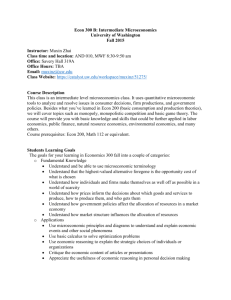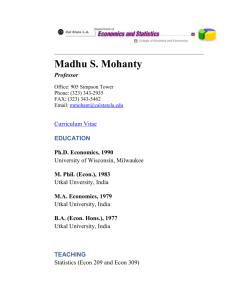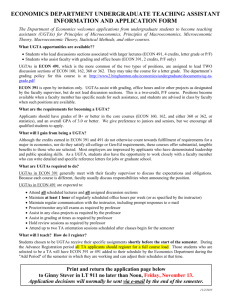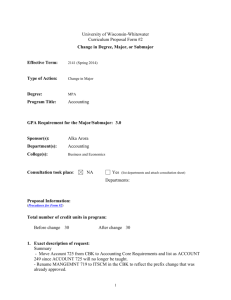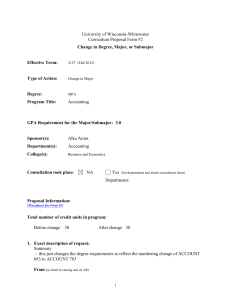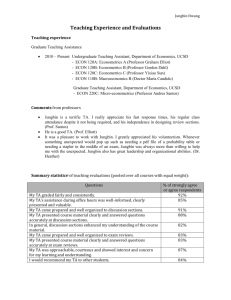Economics - Eastern Washington University
advertisement
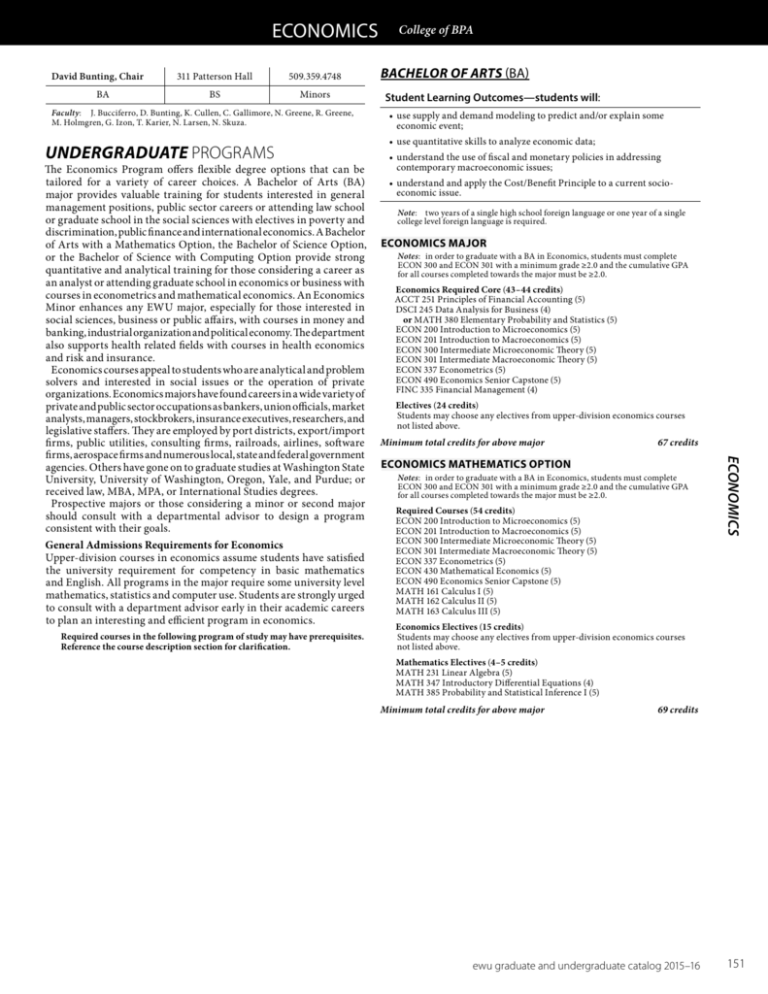
ECONOMICS David Bunting, Chair BA 311 Patterson Hall 509.359.4748 BS Minors Faculty: J. Bucciferro, D. Bunting, K. Cullen, C. Gallimore, N. Greene, R. Greene, M. Holmgren, G. Izon, T. Karier, N. Larsen, N. Skuza. UNDERGRADUATE PROGRAMS Required courses in the following program of study may have prerequisites. Reference the course description section for clarification. BACHELOR OF ARTS (BA) Student Learning Outcomes—students will: • use supply and demand modeling to predict and/or explain some economic event; • use quantitative skills to analyze economic data; • understand the use of fiscal and monetary policies in addressing contemporary macroeconomic issues; • understand and apply the Cost/Benefit Principle to a current socioeconomic issue. Note: two years of a single high school foreign language or one year of a single college level foreign language is required. ECONOMICS MAJOR Notes: in order to graduate with a BA in Economics, students must complete ECON 300 and ECON 301 with a minimum grade ≥2.0 and the cumulative GPA for all courses completed towards the major must be ≥2.0. Economics Required Core (43–44 credits) ACCT 251 Principles of Financial Accounting (5) DSCI 245 Data Analysis for Business (4) or MATH 380 Elementary Probability and Statistics (5) ECON 200 Introduction to Microeconomics (5) ECON 201 Introduction to Macroeconomics (5) ECON 300 Intermediate Microeconomic Theory (5) ECON 301 Intermediate Macroeconomic Theory (5) ECON 337 Econometrics (5) ECON 490 Economics Senior Capstone (5) FINC 335 Financial Management (4) Electives (24 credits) Students may choose any electives from upper-division economics courses not listed above. Minimum total credits for above major 67 credits ECONOMICS MATHEMATICS OPTION Notes: in order to graduate with a BA in Economics, students must complete ECON 300 and ECON 301 with a minimum grade ≥2.0 and the cumulative GPA for all courses completed towards the major must be ≥2.0. Required Courses (54 credits) ECON 200 Introduction to Microeconomics (5) ECON 201 Introduction to Macroeconomics (5) ECON 300 Intermediate Microeconomic Theory (5) ECON 301 Intermediate Macroeconomic Theory (5) ECON 337 Econometrics (5) ECON 430 Mathematical Economics (5) ECON 490 Economics Senior Capstone (5) MATH 161 Calculus I (5) MATH 162 Calculus II (5) MATH 163 Calculus III (5) ECONOMICS The Economics Program offers flexible degree options that can be tailored for a variety of career choices. A Bachelor of Arts (BA) major provides valuable training for students interested in general management positions, public sector careers or attending law school or graduate school in the social sciences with electives in poverty and discrimination, public finance and international economics. A Bachelor of Arts with a Mathematics Option, the Bachelor of Science Option, or the Bachelor of Science with Computing Option provide strong quantitative and analytical training for those considering a career as an analyst or attending graduate school in economics or business with courses in econometrics and mathematical economics. An Economics Minor enhances any EWU major, especially for those interested in social sciences, business or public affairs, with courses in money and banking, industrial organization and political economy. The department also supports health related fields with courses in health economics and risk and insurance. Economics courses appeal to students who are analytical and problem solvers and interested in social issues or the operation of private organizations. Economics majors have found careers in a wide variety of private and public sector occupations as bankers, union officials, market analysts, managers, stockbrokers, insurance executives, researchers, and legislative staffers. They are employed by port districts, export/import firms, public utilities, consulting firms, railroads, airlines, software firms, aerospace firms and numerous local, state and federal government agencies. Others have gone on to graduate studies at Washington State University, University of Washington, Oregon, Yale, and Purdue; or received law, MBA, MPA, or International Studies degrees. Prospective majors or those considering a minor or second major should consult with a departmental advisor to design a program consistent with their goals. General Admissions Requirements for Economics Upper-division courses in economics assume students have satisfied the university requirement for competency in basic mathematics and English. All programs in the major require some university level mathematics, statistics and computer use. Students are strongly urged to consult with a department advisor early in their academic careers to plan an interesting and efficient program in economics. College of BPA Economics Electives (15 credits) Students may choose any electives from upper-division economics courses not listed above. Mathematics Electives (4–5 credits) MATH 231 Linear Algebra (5) MATH 347 Introductory Differential Equations (4) MATH 385 Probability and Statistical Inference I (5) Minimum total credits for above major 69 credits ewu graduate and undergraduate catalog 2015–16 151 EASTERN WASHINGTON UNIVERSITY 2015–16 BACHELOR OF SCIENCE (BS) MINORS ECONOMICS MAJOR ECONOMICS MINOR Notes: in order to graduate with a BS in Economics, students must complete ECON 300 and ECON 301 with a grade point ≥2.0 and the cumulative GPA for all courses completed towards the major must be ≥2.0. Economics Required Core (44–45 credits) ECON 200 Introduction to Microeconomics (5) ECON 201 Introduction to Macroeconomics (5) ECON 300 Intermediate Microeconomic Theory (5) ECON 301 Intermediate Macroeconomic Theory (5) ECON 337 Econometrics (5) ECON 430 Mathematical Economics (5) or ECON 438 Econometrics II (5) ECON 490 Economics Senior Capstone (5) MATH 200 Finite Mathematics (5) or MATH 161 Calculus I (5) Electives (8–10 credits) Choose upper-division courses in Economics. Minimum total credits for above minor Required Courses (5 credits) ECON 100 General Education Economics (5) Electives–choose three courses from the following list (15 credits) ECON 412 Economic History of the United States (5) ECON 415 History of Economic Thought (5) ECON 417 Political Economy (5) ECON 424 Economics of Poverty and Discrimination (5) Total credits for above minor Electives (24–25 credits) Students may choose any electives from upper-division economics courses (not selected above). In addition to upper division economics courses, the following course may be taken for elective credit: FINC 335 Financial Management (4) 68 credits ECONOMICS COMPUTING OPTION ECONOMICS Note: in order to graduate with a BS in Economics, students must complete ECON 300 and ECON 301 with a grade ≥2.0 and the cumulative GPA for all courses completed towards the major must be ≥2.0. Required Core (45 credits) ECON 200 Introduction to Microeconomics (5) ECON 201 Introduction to Macroeconomics (5) ECON 300 Intermediate Microeconomic Theory (5) ECON 301 Intermediate Macroeconomic Theory (5) ECON 337 Econometrics (5) ECON 430 Mathematical Economics (5) ECON 438 Econometrics II (5) ECON 490 Capstone (5) MATH 161 Calculus I (5) Math Supporting (9 –10 Credits) MATH 301 Discrete Mathematics (5) MATH 380 Elementary Probability and Statistics (5) or MATH 385 Probability and Statistical Inference I (5) Computing Related Courses (18 credits) CSCD 110 Introduction to Programming (5) CSCD 255 C Programming for Engineers (5) CSCD 327 Relational Database Systems (4) MENG 201 Introduction to MATLAB (4) or CSCD 409 Scientific Programming (4) Minimum total credits for above major 152 www.ewu.edu 18 credits GENERAL EDUCATION ECONOMICS MINOR One introductory statistics course from the following list DSCI 245 Data Analysis for Business (4) MATH 380 Elementary Probability and Statistics (5) MATH 385 Probability and Statistical Inference I (5) A statistics course approved by the department chair (4 or 5) Minimum total credits for above major Required Courses (10 credits) ECON 200 Introduction to Microeconomics (5) ECON 201 Introduction to Macroeconomics (5) 72 credits GRADUATE PROGRAM 20 credits The Department of Economics does not offer a graduate degree program but does support the College of Business and Public Administration by offering upper-division and graduate courses in economics. Students considering selecting economics courses for elective graduate credit should consult with their advisor. ECONOMICS continued Economics Courses Terms offered: If no terms are indicated, check with the department or EagleNET. ECON 100 General Education Economics (5) Satisfies:the GECR for social sciences, list 1, economics and government. General consideration of economic reasoning and methodology through examination of fundamental concepts in micro- and macroeconomics and through extension and applications of economic theory. ECON 200 Introduction to Microeconomics (5) Satisfies:the GECR for social sciences, list 1, economics and government. Prerequisite: MTHD 104 completed. Examines the general functioning of a price system using fundamentals of supply and demand. Explores the variety of market forms, theory of factor incomes and the effects of government intervention to promote efficiency and equity. ECON 201 Introduction to Macroeconomics (5) Satisfies:the GECR for social sciences, list 1, economics and government. Prerequisite: MTHD 104 completed. Reviews national income accounts and the determinants of national income and employment for an economy. Explores the impact of monetary and fiscal policy on aggregate performance and considers specific problems such as full employment, inf lation, economic growth and international economic relations. Prerequisites: ECON 200 and ECON 201 or instructor permission. Theoretical basis of exchange, production, private markets and their forms, income distribution, the public sector, resource allocation, welfare economics and application of economic theory to public and private decision making. ECON 301 Intermediate Macroeconomic Theory (5) Prerequisite: ECON 200 and ECON 201 or instructor permission. With references to recent experiences, a theoretical framework is developed to explain the determination of output, employment, price level, interest rate and economic growth of an aggregate economy. Using case studies, policy implications and alternatives are explored. ECON 337 Econometrics (5) Prerequisite: ECON 200, ECON 201 and DSCI 245 or MATH 380 or MATH 385 or instructor permission. Using appropriate statistical software packages for data analysis, examines applications of linear regression and hypothesis testing to provide information for economic and business decision-making. ECON 399 Special Studies (1–5) Prerequisites: ECON 200 and ECON 201 or permission of the instructor, department chair and college dean. Subjec ts va r y accord i ng to facu lt y a nd student interest. ECON 412 Economic History of the United States (5) Cross-listed: Prerequisite: HIST 487. junior standing. Economic development of the United States from the early colonial period to the present: explorations, westward movement, labor, rise of great industries, world trade and post-war economic problems. ECON 444 Money and Banking (5) junior standing. Economic thought to the early 20 th century; special attention to selected writers including Aristotle, the Mercantilists, the Physiocrats, Hume, Smith, Malthus, Ricardo, Marx, the Marginalists and Marshall. ECON 417 Political Economy (5) Prerequisite: junior standing. How public decisions can be made more rational, more productive of welfare, or more in the general interest. Selected literature from economics, political science and related disciplines provides an analytical framework for the discussion of a number of social problems. ECON 421 Labor Economics (5) Prerequisite: ECON 200 or instructor permission. Supply and demand for labor and important institutions in the labor market, especially the upgrading of labor via education and vocational training, the mobility of labor, the inf luence of trade unions on wages, the effects of race and sex discrimination on wages and labor’s inf lation unemployment problems. ECON 424 Economics of Poverty and Discrimination (5) Cross-listed: Prerequisite: Satisfies: AAST 424, WMST 426. junior standing. cultural and gender diversity university graduation requirement. ECON 445 Insurance and Risk (5) Prerequisite: ECON 200 or instructor permission. This course examines the principles of insurance and ways of managing risk. It includes discussion of the development and forms of private and social insurance programs. ECON 450 Public Finance and Public Policy (5) Prerequisite: ECON 200 or instructor permission. Examines the causes and consequences of government in the U.S. economy and impact of government expenditure and revenue-raising activities. ECON 452 Health Economics (5) Prerequisite: ECON 200 or instructor permission. Examines economic aspects of health care, including factors inf luencing the demand and supply of health services and the roles of insurance and government in health care markets. ECON 454 Sports Economics (5) ECON 427 The Economics of Women and Work (5) ECON 200 or instructor permission. This course uses microeconomic principles to examine the behavior of individuals, teams, leagues, unions and government in the production and consumption of sports entertainment. Topics covered include: competitive balance, salary caps, stadium financing and collective bargaining. ECON 457 Natural Resource Economics (5) WMST 427. junior standing. cultural and gender diversity university graduation requirement. Prerequisite: Economic impact of the increasing participation of women in the paid labor force of the United States. Economic theories of labor force participation, discrimination and occupational segregation. Current issues such as comparable worth, aff irmative action, nontraditiona l careers, corporate policies, sexual harassment, child care and social welfare programs. ECON 429 Women and Men in the U.S. Economy (1) Cross-listed: ECON 200 and ECON 201 or instructor permission. Reviews contemporary U.S. banking practices and regulations; surveys theories of interest rates and bank behavior; surveys monetary policies and determinants and effects of Federal Reserve policies. Prerequisite: Causes of poverty and evaluation of anti-poverty programs. Examines economic theories of discrimination from different perspectives with a particular focus on issues of gender and race. Cross-listed: Prerequisite: Satisfies: Prerequisite: WMST 402. In the course we examine the economic activity and labor force participation of women and men in the United States. Employment issues, such as labor market discrimination, affirmative action and comparable worth will be discussed. Other topics include income distribution, poverty, welfare programs and the tax system. ECON 200 or instructor permission. Uses microeconomic reasoning and models to examine the allocation and management of non-renewable and renewable resources such as land, water, fossil fuels and mineral resources, fisheries and forests. ECON 458 Urban and Regional Economics (5) Prerequisite: ECON 200 or instructor permission. Economic analysis of urban and regional economies with an emphasis on the Pacific Northwest. Topics covered: spatial economic theory; regional economic growth and stability, land use, urban problems and policies, transportation issues, local government public finance and methods of regional analysis. ECON 470 International Economics (5) Prerequisite: Satisfies: ECON 200 and ECON 201 or instructor permission. international studies university graduation requirement. Prerequisites: ECON 200 and MATH 161. Interaction of national economics and the problems arising there from, particularly trade and payments problems and the development of regional and international economic institutions. ECON 433 Industrial Organization (5) Prerequisites: ECON 200 and ECON 201, FINC 335 or instructor permission. ECON 430 Mathematical Economics (5) Mathematical methods and techniques applied to economic problems. Prerequisites: ECON 200. Industrial organization is the study of industry and firm behavior. This course will use the basic tools of microeconomic theory and game theory to explore the relationships among firms in an industry or across industries and examine the nature of strategic interaction among firms. ECON 474 International Finance (5) The material in this course develops a general framework to analyze international financial markets, exchange rates, exchange rate derivatives and open macroeconomic economies. ECON 475 Economic Development (5) Prerequisite: ECON 200 and ECON 201 or instructor permission. international studies university graduation requirement. ECON 438 Econometrics II (5) Satisfies: This course extends the modeling, estimation, inference and forecasting tools to include momentbased estimation, simultaneous equations models, non-stationary data and co-integration, VAR and ARCH models. D e velopment pro s p e c t s of pre s ent- d ay underdeveloped countries. Historical development of industrial countries by analogy. Attention given to both economic and non-economic factors in the development process and to population problems and human resource development. Prerequisites: ECON 337 or instructor permission. ECONOMICS ECON 300 Intermediate Microeconomic Theory (5) ECON 415 History of Economic Thought (5) Prerequisite: ewu graduate and undergraduate catalog 2015–16 153 EASTERN WASHINGTON UNIVERSITY 2015–16 ECON 490 Economics Senior Capstone (5) Prerequisites: ECON 337 and senior standing. Satisfies: senior capstone university graduation requirement. This course includes four components: 1.review of modern theories of employment, job search and wage determination 2. portfolio preparation 3. program assessment and 4. a final economics project. ECON 495 Internship (3–5) Prerequisites: permission of the instructor, department chair and college dean. ECON 497 Workshops, Short Courses, Conferences (1–5) ECON 498 Seminar (3–5) ECON 499 Directed Study (1–5) Prerequisites: permission of the instructor, department chair and college dean. ECON 200 and ECON 201 and at least 5 credits of prior 400 level ECON courses. Independent study projects in selected fields of economics. Limited to senior and graduate students. ECON 598 Graduate Seminar (1–4) Prerequisites: permission of the instructor. Variable topics. ECON 599 Independent Study (1–4) ECONOMICS Prerequisites: permission of the instructor, department chair and college dean. ECON 696 College Teaching Internship (1–4) Teaching a lower-division college course under supervision of a regular faculty member. Includes course planning, arranging bibliographical and other instructional aids, conferences with students, experience in classroom instruction and student course evaluation. ◆ Money, n. A blessing that is of no advantage to us excepting when we part with it. An evidence of culture and a passport to polite society.—Ambrose Bierce, writer (1842–1914) 154 www.ewu.edu
